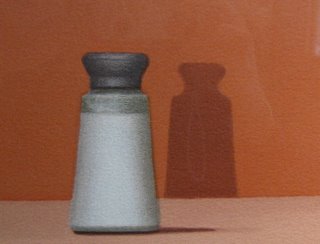 "Court officials in Jefferson County, Alabama, were skeptical at first when they encountered a potential juror who said her name was 'Jesus Christ.' But the 59-year-old Birmingham woman, who had her name changed in probate court, assured the residing judge that was her name. Christ was called to jury duty for a criminal case but was excused because she was disruptive. Instead of answering questions, Christ was asking them. Efforts to reach Christ were unsuccessful." from Religion News Service.
"Court officials in Jefferson County, Alabama, were skeptical at first when they encountered a potential juror who said her name was 'Jesus Christ.' But the 59-year-old Birmingham woman, who had her name changed in probate court, assured the residing judge that was her name. Christ was called to jury duty for a criminal case but was excused because she was disruptive. Instead of answering questions, Christ was asking them. Efforts to reach Christ were unsuccessful." from Religion News Service.
Tuesday, January 12, 2010
Want Jesus on your Jury?
Labels: Legal System
Thursday, January 1, 2009
Happy California 2009
The leading state in the union has, as usual, a number of new laws in the new year. They are summarized here.
Labels: Legal System
Friday, May 23, 2008
Thursday, May 15, 2008
Friday, October 13, 2006
Churchill, Bono, Lincoln and Holmes

Quote of the day:
“This is the sort of errant pedantry up with which I will not put.”
--Winston Churchill, responding to an aide who, in editing one of Churchill’s speeches, had changed a sentence ending with a preposition.
Quote of the day No. 2:
“It’s a beautiful day, don’t let it get away.”
--U2
(even in Buffalo, buried under snow today)
Statistic to anticipate:
It’s the time of year when we’ll hear about surveys showing that more high-school students can identify Justin Timberlake than Abraham Lincoln. This will be followed by various “ain’t it awful” interviews with experts who, we assume, can identify both Timberlake and Lincoln. I am on the edge of my recliner.
Justice quote of the day:
“Prison does not deter crime because criminals are too crazy, too drunk, too high, too uneducated, too unintelligent and too young to fully comprehend what they were doing at the time they broke the law.”
--Convicted murderer Jens Soering, in his book "An Expensive Way to Make Bad People Worse."
Justice quote of the day No. 2:
“General propositions do not decide concrete cases.”
--Oliver Wendell Holmes
When we hear about a crime--or, worse, are the victim of one--the focus is on dealing with whoever did it. If and when the person is convicted and sent to jail, we are relieved. They are away from us, and can do no harm. But what then?
This is an uncomfortable question which we dismiss, as individuals (unless it is someone we love who is in jail) and as a culture. It’s as if we expect the key to be thrown away.
Look at the multiplicity of TV shows about crime--they are all about analyzing evidence, catching and convicting. The only show about prison right now is "Prison Break," but it’s mostly a cat and mouse drama. The HBO show "Oz" was an excellent, in-your-face drama set in prison, but it’s gone now. It was so harsh it was difficult to watch.
I am no expert on criminal justice or how rehabilitation might be possible. But it’s hard not to notice that we seem to be focused on finding criminals and putting them away, with no consideration of what is going to happen when they are away to make them different when they are released.
Which 99% of them are.
Labels: Legal System
Monday, October 2, 2006
Perpetrators: Inside and Outside

Quote of the day:
“If you can’t stand to be alone with yourself, why do you inflict yourself on us?”
--Carl Jung
If you’re familiar with "The New Yorker," you know that they publish one short story in each issue. I was quite taken by Antonya Nelson’s story "Kansas," which appeared in the September 4, 2006 issue. It describes a family coping with a problem-plagued adolescent who disappears with her young niece. The story says this about the psychologist father of the adolescent:
“He’d never grown accustomed to thinking of [his daughter] as a criminal, even when she’d been arrested and charged, found guilty and made to pay--this despite the fact that he made his living hearing how people were routinely failed by their loved ones.”
This is such an eloquent way of describing the difference between “inside” and “outside” views of criminal behavior. The “outside” view is on display in the reality show “Cops,” which shows incident after incident of people behaving illegally (and sometimes bizarrely) and being arrested for it. We learn little about where these people came from or who their family is. We do know that they’re going to jail.
There is so much crime news and TV programming available to us. Today, in fact, we’re hearing about the third school-shooting incident in the last week. We watch all this criminal behavior and may begin to unreasonably (or irrationally) classify or dismiss such people as “bad,” “crazy,” or “evil.”
Similarly, family members or friends of those arrested may unreasonably (or irrationally) deny that the behavior happened.
As always, the truth resides somewhere in the middle of this.
Labels: Legal System






